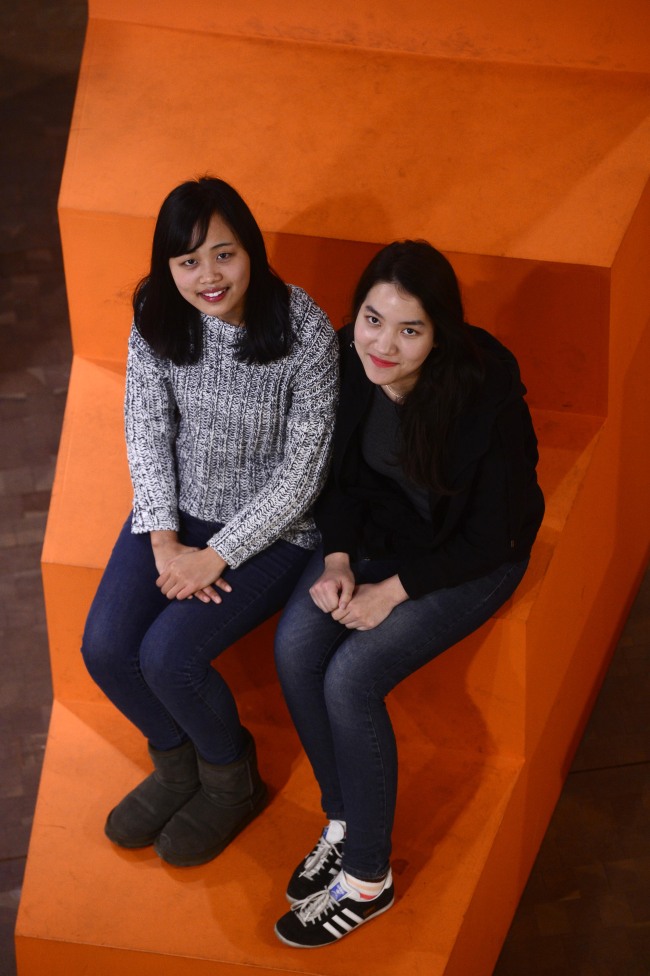Foreign student interns at Seoul Museum of Art say rigid hierarchy is biggest sticking point
 |
|
Liu Jing (left) and Mary Tarakey pose at the Seoul Museum of Art headquarters in Seoul where they work as student interns. (Park Hae-mook/The Korea Herald) |
For foreigners joining the Korean workforce for the first time, addressing seniors and coworkers properly can be a major challenge. That is how Liu Jing, 24, from China and Mary Tarakey, 24, from Switzerland felt when they started interning at the Seoul Museum of Art headquarters.
“It was really difficult to adjust to this kind of working atmosphere. There is a strict hierarchy between seonbaes (seniors) and hubaes (juniors), so you have to make sure to adjust properly to those who are above your position,” said Tarakey, a senior undergraduate student at Hanyang University. “It is very difficult for me.”
The two are working at the museum under the Seoul Global Internship Program, sponsored by the Seoul Metropolitan Government since 2008. Through the program, foreign students enrolled in a Korean university can experience working at public institutions alongside Korean civil servants for seven weeks.
Liu and Tarakey applied for the program because they wanted to experience Korean work culture and contribute their skills and talents where needed. Both speak Korean fluently. Liu is a native Chinese speaker, while Tarakey speaks Italian as her mother tongue and also can speak English.
“Something I still struggle with is figuring out what to call my seniors. Since I don’t know everyone’s titles or positions, I would just refer to everyone as ‘teacher’ in hopes of showing respect towards anyone and everyone,” said Liu, a graduate student majoring in Korean language and literature at Yonsei University.
In Korea, hierarchy is the defining basis of relationships, particularly in the workplace where one’s authority rises with position and age. Therefore, addressing someone by his or her job title or position is important because title indicates status. If seniors are not addressed by juniors in a way that fits his or her position, the senior may feel offended.
“The most difficult part of the internship is always making sure that I am not rude. … It can be quite a burden,” added Tarakey, who is searching for jobs in Korea. Born to a Korean mother and Swiss father, she lived in Switzerland until she entered Hanyang University.
“Even greeting people is difficult because we meet them several times a day and don’t know whether to bow or greet them every time or not,” Liu said. “I think the internship is good training for a future job here.” Liu majored in Korean during her undergraduate studies in China before coming to Seoul two years ago to further study the Korean language and culture. She hopes to work here upon graduation.
For Tarakey, the collectivist nature of Korean culture has been another difficulty at work: “Always having to be with all the coworkers during lunchtime was hard. I noticed that Koreans like to create groups and do things together, but sometimes I just want to go to a quiet place and be all by myself.”
There were also small humorous instances of miscommunication.
“A ‘teacher’ who sat behind me called me over saying, ‘hold on’ in Korea. So I simply stopped working and waited. After a few seconds, she called me again and said, ‘Liu Jing-ssi (Ms. Liu Jing), hold on.’ I turned around and saw that she was motioning for me to come over. That’s when I realized ‘hold on’ also meant ‘come over,’” Liu said.
Nonetheless, the interns said they have been successfully carrying out their assigned duties. Their work includes searching and gathering information about SEMA and different exhibits at its four branches, and sharing that information with non-Koreans via social media platforms.
Liu launched SEMA’s first official page in Chinese on Sina Weibo, a popular Chinese social networking site. She also runs a personal blog linked to the Weibo page that shares details about SEMA and current exhibitions, as well as her personal reflections.
“I was managing a personal blog that introduces Korea and Korean culture to Chinese friends and visitors, even before I started my internship at SEMA,” Liu said. “Still, it was difficult to start an ‘official’ Weibo webpage for the museum from scratch.”
Tarakey publicizes similar information about SEMA via her blog on Wordpress, one of the world’s most popular blogging systems in use today. Her posts are written in both English and Italian.
“For now, we don’t get much traffic on our websites since they are new and not many people know about it,” said Liu. “However, if we could make a small contribution in lessening the gap between China and Korea and helping the two nations understand each other better, I think it is meaningful.”
By Sohn Ji-young (jiyoung.sohn@heraldcorp.com)